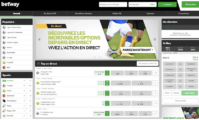
The Coronavirus (Covid-19) crisis has placed the sports betting sector and clubs under tremendous pressure. But it has also shown how the industry can respond responsibly to events, with regulators working closely with the sector to provide some much-needed adjustments in these extraordinary times, says Hervé Schlosser, founder and CEO of Sportnco.
The coronavirus (Covid-19) pandemic is a time of unprecedented concern for all those involved in the online sports betting sector. It means huge uncertainty for us as an industry, but also for the sports clubs, leagues and federations that produce the content on which we rely to offer our services and products.
Their survival may depend on how much of support they receive from their respective governments, but the loss of any sports clubs, especially the smaller ones, is also felt across local communities. This has a long-term impact on our activity, as first and foremost betting consumers are sports fans and enthusiasts. This is why as an industry we must hope that as many clubs and federations as possible survive the Covid-19 crisis.
At an individual level, Sportnco is fortunate to be in a position where it does not have to furlough any of its staff. Thanks to our strong performance in recent years and the investment and strategic backing of our institutional partner BNP Paribas we have the financing to see this period through.
As a company we are using the current lockdown period to invest in technology, systems and capabilities to ensure we are primed and ready once sporting action returns. This means optimising our operations, moving ahead on integration projects with data and odds suppliers, launching client apps and site redesigns.
In terms of volumes and activity, sports betting stakes in France have dropped considerably, 39% in March compared to February. However we have been very active in order to maintain as much offer as possible for our clients, by adding immediately new authorised competitions in France and new offers in other regulations, while ARJEL and operators have reinforced their responsible gambling messaging.
Importance of responsible gambling
Casino is a welcome additional revenue stream for those able to offer it. At the same time, the sector must act with the utmost responsibility when it comes to advertising, marketing and monitoring customer spend and any sign of problem gambling or addiction.
As is the case in the UK, politicians are watching closely and will not look kindly on any corporate or social responsibility transgressions during this period. From speaking to our clients and many contacts across the sector in Belgium and Spain, where the casino vertical is regulated, this is something to which operators are strongly committed.
This, in turn, made the news on 1 April that the Spanish government had banned all gambling advertising and prohibited email communications or advertising on social media was so disappointing. The measure means Spanish operators are not allowed to run acquisition or retention campaigns that offer financial rewards, bonuses, discounts, free bets or games, odds multipliers or any other form of prize during the lockdown period.
The government took action after the country’s gambling regulator Dirección General de Ordenación del Juego (DGOJ) reported an increase, rather than a downturn, in online gambling activity in recent weeks. The wellbeing of players is of course paramount, but gambling that is promoted and run in a responsible is a vital leisure activity in this particularly difficult period and provides vital revenue for operators.
In addition, at a time when people are worried about their jobs and their families’ futures, I believe the industry will act in the best interests of their players. It will show regulators that it can be trusted when it comes to responsible gambling and player safety.
Streamlined processes
As you know, France has a reputation for being a tough market with restrictive regulations. However, gambling regulator ARJEL has been working closely with operators since the start of the crisis to broaden their offering and authorise bets to be offered on new competitions.
These include bets on Chinese football and Taiwan baseball leagues. The onus is on operators to prove first that these competitions have taken sufficient measures to protect themselves from any threat of match-fixing and that there is interest from French players to bet on these events, which there is. Although it is true that it will mainly come from experienced bettors.
The French authorities have also loosened the system around ID verification that requires players to send their ID verification code to operators with whom they have opened an account. Instead they can now send a proof of address document. Certifications, audit requirements and monthly tax payments have also been deferred.
For companies needing government support, the French state has been highly proactive and stepped in to provide 84% of furloughed staff wages with a cap set at 4.5 times the country’s minimum monthly wage of €1,219 (£1,064/$1,330) a month. It will also assist companies with a €300bn programme of state-guaranteed loans of up to 25% of their annual turnover with annual interest rates set at 0.25%.
Contributions to company pensions and national insurance schemes, business rates and rents, have also been pushed back to give operators the time to acclimatise to the new environment.
As a company headquartered in France, Sportnco is fully aware of the reputation the country has for being overly bureaucratic. However, the administrative processes the authorities have put in place to address the Covid-19 crisis have been highly effective and streamlined.
They provide some much-needed stability at this most uncertain period for all those working in the sports betting sector, clubs and federations. And with the sports leagues potentially restarting in June or early July, there may also be some most welcome news to look forward to in the coming weeks.



